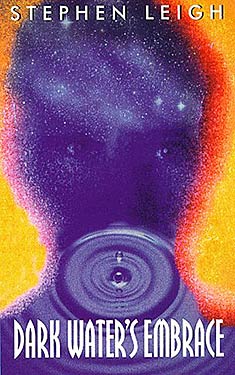Stephen
Leigh
Completed 4/24/2020,
Reviewed 4/24/2020
5 stars
This was a
really terrific novel. It was really
well written. It delivered quite an
emotional punch and I could barely put it down.
It’s rather complex, with multiple story lines played out simultaneously
and changing voices. But I had no
trouble following it. It follows the
descendants of nine stranded space explorers on a distant planet called Mictlan. One of the descendants is a hermaphrodite and their mere
presence throws the colony into disarray.
At the same time, it tells the story of the beginning of the end of the
indigenous population two thousand years prior to human’s arrival. It won the Gaylactic Spectrum Award in 1999.
 The story
begins with the discovery of a bog person, that is, the well-preserved remains
of an indigenous sentient being on Mictlan, called a Miccail. Anais is a doctor and is doing a forensic
study on the remains. She finds that the
Miccail is a hermaphrodite, and seems to have been ritually killed. Anais herself is a hermaphrodite, but
identifies as female. She feels that
fate is slapping her in the face, bringing her this being at a time when she
questions her own identity. Rumors fly quickly
throughout the small colony, and the big one is about Anais’ physiology as
well as her sexuality. You see all emphasis in the colony is on
reproduction. All women are expected to
bear lots of children. But there’s something
about the planet, as well as the lack of genetic diversity, that causes
miscarriages, high infant mortality, and deformities. So the
mere fact that Anais is basically celibate and possibly lesbian brings the angry
focus of the colony onto her. Their punishment
for members of the colony who bring disruption is shunning, basically exile.
The story
begins with the discovery of a bog person, that is, the well-preserved remains
of an indigenous sentient being on Mictlan, called a Miccail. Anais is a doctor and is doing a forensic
study on the remains. She finds that the
Miccail is a hermaphrodite, and seems to have been ritually killed. Anais herself is a hermaphrodite, but
identifies as female. She feels that
fate is slapping her in the face, bringing her this being at a time when she
questions her own identity. Rumors fly quickly
throughout the small colony, and the big one is about Anais’ physiology as
well as her sexuality. You see all emphasis in the colony is on
reproduction. All women are expected to
bear lots of children. But there’s something
about the planet, as well as the lack of genetic diversity, that causes
miscarriages, high infant mortality, and deformities. So the
mere fact that Anais is basically celibate and possibly lesbian brings the angry
focus of the colony onto her. Their punishment
for members of the colony who bring disruption is shunning, basically exile.
In parallel
with this story is the tale of the Miccail hermaphrodite, known as KaiSa (Kai
being their name and Sa indicating that they are the third gender). The KaiSa is a member of a holy community
which facilitates reproduction of the Miccail.
However, the leaders of one of the provinces of Mictlan are quickly
invading its neighbors, with the aim to take over the world. They have a special distaste for the Sa and believe
they are interfering with reproduction, not facilitating it. KaiSa’s mission is to try to broker peace
with the invaders.
The story is
complex; the book has a neat form that makes following it very easy. All chapters told in first person are labeled
“Voice” plus the name of the character speaking. All chapters told in third person are labeled
“Context” plus the name of the character whose action is being described. All chapters about KaiSa are labeled “Interlude:
KaiSa”. Lastly, there are chapters labeled
“Journal Entry: Gabriela Rusack” which are, well, journal entries of one of the
original nine colonists who was shunned by the colony for being lesbian. Together these chapters weave the dramatic
tale of the fate of Anais, the colony and the Miccail.
The
characterization is tremendous. By
changing the first-person perspective to tell the narrative linearly, we get a
deep understanding of what makes many of the characters tick. There is only one character I would call
one-dimensional, that is Dominic, an elder who is violently pressing for Anais’
shunning. But the four main characters,
Anais, Elio, Maire, and KaiSa are all very well developed.
The world
building is also tremendous. The Miccail
society is expertly fleshed out by the KaiSa narrative. We learn of their world, their religion,
their sexuality, and their struggles. It’s
a very complete picture of an alien society.
And the author uses ke/ker as pronounces for the third gender which was
very easy to follow. Of course, this book
is over twenty years old, so it is before the current use of xe/xer, or the use
of third person plural pronouns. The
structure of the colony, known as the Rock, is also well developed. It does help with both worlds that the author
provides a brief glossary of terms at the beginning of the book.
I give this
book five stars out of five. It really
packed an emotional punch for me. The
sexism, homophobia, and xenophobia make it extremely uncomfortable, and more
importantly, horrifying. I identified deeply
with Anais, Elio, and Maire, again, by virtue of the quality of the characterization. There is a sequel which I may have to pick up
simply because I so loved the characters and the world that Leigh created. I believe this book and its sequel are out of
print, but they are available in e-format.
No comments:
Post a Comment